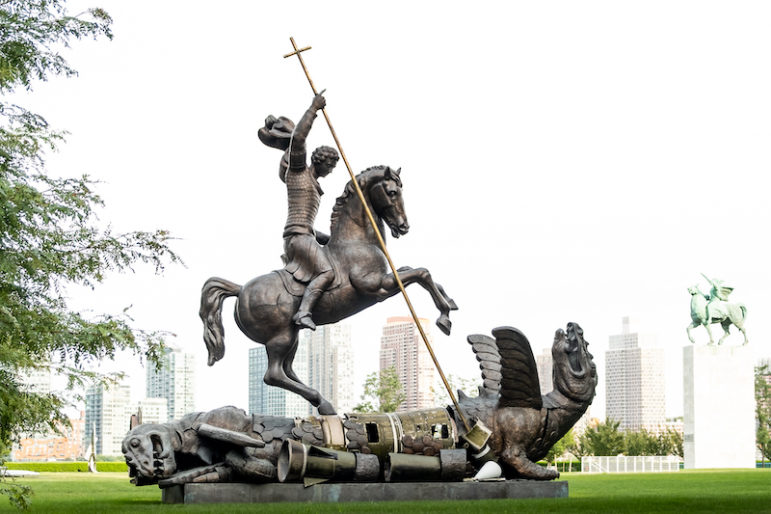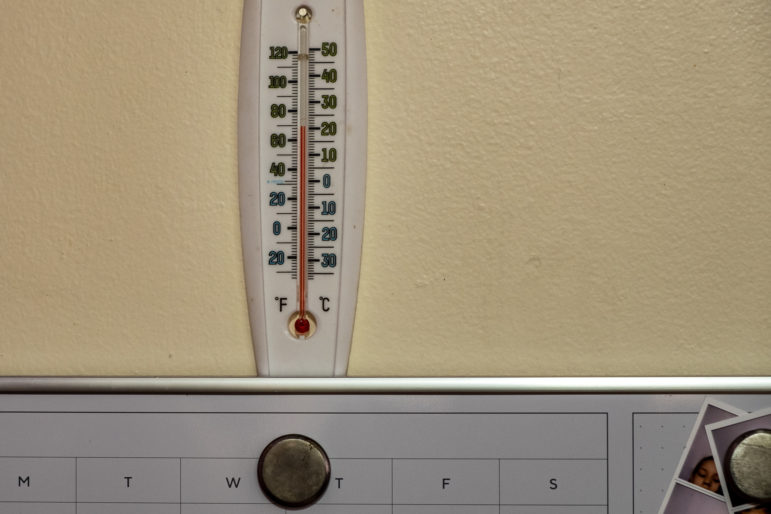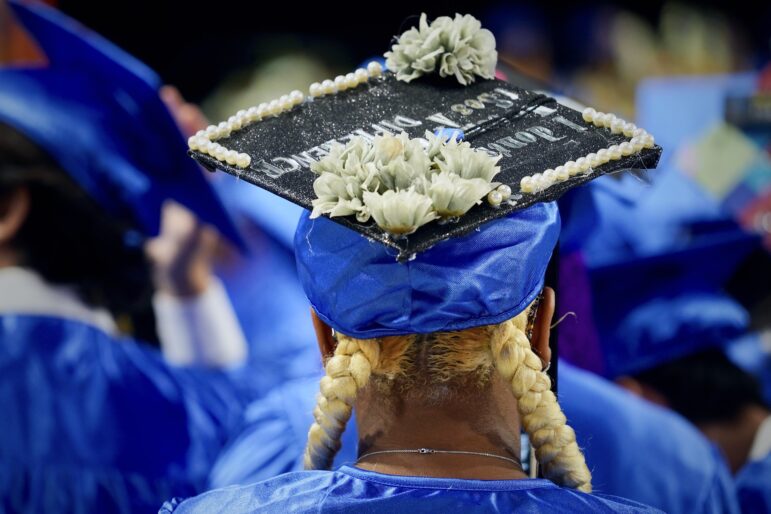The atomic bomb that the U.S. dropped 75 years ago was built by a project named after one of the boroughs. Manhattan, however, was also an early site of resistance to nuclear arms.

Adi Talwar
The statue ‘Good Defeats Evil’ outside the United Nations, created by Zurab Tsereteli, depicts the slaying of a beast composed of the remnants of Soviet and U.S. nuclear weapons.New York City’s history of “no nukes” sentiment is driving a piece of City Council legislation that eyes ties between the city’s pension funds and the nuclear weapons complex.
The atomic bomb that the United States dropped on Japan 75 years ago Thursday was the product of the Manhattan Project, so named because early work on “the bomb” took place in New York City. Manhattan, however, was also an early site of resistance to nuclear weapons.
A history of resistance
Concern about the moral and security implications of the atomic age took shape within a matter of months in the city. The New Yorker magazine devoted almost all of its August 31, 1946 edition to documenting the horror of what the device called “Little Boy” did to Hiroshima. It is said that Albert Einstein bought 1,000 copies.
At noon on June 15, 1955, when every able-bodied person in New York not working in essential government services was ordered into fallout shelters for a citywide civil-defense drill, a small group of protesters from the Catholic Worker, the War Resisters League and other groups headed to City Hall Park. There they publicly refused to take part in what they considered a normalization of the atrocity of nuclear warfare, according to John Loughery and Blythe Randolph’s recent biography of Dorothy Day. They were arrested, briefly jailed, and made national headlines. It was a small preview of the anti-nuclear sentiment that, 27 years later, drew a million people to Central Park for what was at that time the largest demonstration in U.S. history.
Though faded “fallout shelter” signs still adorn the basement entrances of some buildings, there is little discussion of the nuclear threat to New York City today. Material from the city’s Office of Emergency Management about radiological risks focuses on the potential impact of a “dirty bomb” rather than the threat of an enemy warhead. Over the past two decades, the local anti-war movement has had conventional conflicts, like the invasion of Iraq and the use of drones in Afghanistan, to worry about.
Plenty of bombs
But nuclear weapons are still very much a part of the U.S. arsenal, and those of its friends and rivals.
According to the Federation of American Scientists, the United States still has 1,750 nuclear warheads deployed in land-based Minuteman missiles, aboard Trident submarines and in the bombs carried by B-52 long-range bombers. Russia is estimated to have abut 1,600 warheads deployed. Together, the U.S. and Russia have another 8,100 warheads in stockpiles.
The other members of the nuclear club have far fewer—China about 320, Pakistan 160, North Korea 35 or so—but you don’t need but one to achieve mass destruction, as the residents of Hiroshima learned at 8:15 on a Monday morning.
Despite the clear numerical advantage enjoyed by the U.S., conservative policy advocates have been calling for years for an expensive effort to revamp the arsenal, and President Trump has asked Congress for steep increases in funding for new and improved nuclear arms.
Council considers new steps
Two pieces of legislation before the City Council, both of them authored by Finance Committee Chair and Queens Democrat Danny Dromm, push in a very different direction.
Resolution 976 would, among other things, call on the New York City Comptroller to instruct the public employees’ pension funds to “divest from and avoid any financial exposure to companies involved in the production and maintenance of nuclear weapons.”
Intro 1621 would create “an advisory committee to examine nuclear disarmament and issues related to recognizing and reaffirming New York city as a nuclear weapons-free zone.”
Both measures have at least 34 co-sponsors in the 51-members, a veto-proof majority.
The measures could be dismissed as symbolic grandstanding by a legislative body that barely has authority over the city budget, let alone nuclear weapons. But divestment has proven in the past to be a powerful tool for advocates hoping to get the five boroughs on the right side of national issues. The city’s pension funds are exploring how to divest from fossil-fuel reserve owners. All five of the city’s pension funds have gotten out of stocks associated with the private-prison industry, and some of them have divested from gun manufacturers and retailers, as well as from thermal coal companies. The state pension fund froze its holdings of tobacco stocks in 1996 and firearms companies in 2013, has moved away from private-prisons stocks and divested in 2009 from companies doing business in Iran and Sudan. Many of those changes in investment strategy came after sustained public pressure.
Divestment risks and rewards
The challenge for proponents of nuclear-weapons divestment is that the list of companies linked to the production or maintenance of nuclear weapons or delivery systems includes some of the largest corporations in the country. One of those firms, Boeing, is one of the top 40 stocks in the city’s pension portfolio—with $110 million in holdings at last count. And the pension funds’ primary purpose is to make sure the city can pay retirees’ pensions without having to ask taxpayers to help out.
Divestment proponents insist nuke stocks can be cut out without exposing the pension funds to new risks or lower earnings. At a January hearing on Resolution 976, Michael Lent, the chief investment officer at Veris Wealth Partners LLC, says a lot of his clients have been excluding nuclear weapons stocks for years. “It has made little or no difference to the returns they received versus traditional portfolios that include manufacturers of nuclear weapons,” he said.
Supporters of the two measures say the risk posed by nuclear weapons is far from passé. Tom Gogan, representing the New York Chapter of U.S. Labor Against the War, noted to the Council in January that the Bulletin of the Atomic Scientist had recently adjusted its “doomsday clock”–which represents the perceived threat of nuclear conflict—to 100 seconds to midnight, the most dire assessment ever. Nuclear tensions between the U.S. and North Korea or Iran mean that “we are at an incredibly dangerous moment in the history of the human race and our entire planet.”
The office of Comptroller Scott Stringer indicated to City Limits this week that it remains focused primarily on the fossil-fuel divestment. While the focus of all city government in months ahead will be on navigating the COVID-19 crisis, it will be interesting to see if Speaker Corey Johnson, who like Stringer is seeking the Democratic nomination for mayor, moves Resolution 976 or Intro 1621 to a vote.









2 thoughts on “Hiroshima +75: Where the NYC Council’s No-Nukes Legislation Stands”
Thank you so much City Limits for coverage, especially in this deeply profound, mighty week of the 75th Anniversary of Hiroshima/Nagasaki, honoring and commemorating those who’ve suffered and died not only in Hiroshima (Aug. 6th) and Nagasaki (Aug 9th), but the millions who continue to die and suffer from cancers from this industry,
as Gandhi called it, “The Most Diabolical use of science”,
and as Albert Einstien who fought the military use of this device, calling it among many things “A false sense of security.”
US citizens would highly benefit to read the fuller history which necessarily include the archives of Japan and Russia. As was made clear in the 2005 book, Racing the Enemy, Japan ended the war more because Russia was swiftly heading to it’s shores, not because of the bomb.
Trillions of our tax monies, and much more that we’ll never know about, because the nuclear weapon industry remains largely secret and outside the realm of “democracy”, oversight, transparency, never mind discussion.
We need this money desparately today for our health care, our urgent climate crisis, housing, education, mental health, reforms of all kinds.
Comptroller Scott Stringer needs to walk and chew gum at the same time. His relative, our great NYC leader Bella Absug, a vital anti-nuke advocate in the 70’s and 80’s who invited Soviet delegations to NYC during the heights of tensions, and spoke at our many meetings and rallies, would put him over her knee! This is a much easier and less complicated ask than fossil fuels.
A huge congrats to CM Danny Dromm for spurring this on, and for all the CM’s who moved it forward. The hearings on January 28th, 2020 at City Hall were magnivicent and are up online for all to watch, as well as the over 70 experts who submitted written testimonies.
Our country shunned and boycotted the 122 nations who tried to explain to the nuclear weapon states that they are gravely endangering all life, at great cost.
A magnificent, beautiful Treaty on the Prohibiton of Nuclear Weapons was hard won, and adopted July 2017, and signed at the UN in Sept. 2017. Pope Francis opened the conference and has been a tireless advocate telling the world, that not only the use, but the possession of these weapons is immoral.
We need a few more states to sign the TPNW on to make it international law. We need a good ally to tell us, enough is enough.
The NY City Council, as it too faces and deals with racism, heard at the bills hearings how this industry has been racist at it’s core from the start…. the testing, the dumping done on indigenous and lands of our poor and marginalized.
The city as it deals with financial crisis, heard the known trillions of our tax monies spent on this single industry. Today we are spending more on nuclear weapons than at the hieght of the Cold War. There is no reason for this except profits for stock holders, yes, Boeing, Lockheed Martin, Gruman, and thousands of others.
Let’s make our money on companies that will save the planet instead.
As a 5 generation New Yorker, I’ve no fear of being bombed by Russia or China…. they are both entrenched in this city. The fear is incompetence, human error, malfunction, cyber attack, or sheer madness. Many knew this in 1945. A number of key Manhattan Project scientists lobbied our leaders to immediatly share our findings with the Soviets.
New Yorkers have a great person to look to among many…. Dorothy Day, who was the first one to denounce the bomb in published writing, who went on years later in the 1950s getting arrested each time the city called from mandatory Civil DeFense drills, like there was a way to protect yourself in a shelter, as mentioned in this article. (disclosure, not one of those shelters would have saved anyone in nuclear attack.)
Bayard Rustin, the man behind the March on Washington in 1963, who went to Russia in the 1950’s to form bridges to stop the madness, held one of the first demonstrations with the War Resisters League here in NYC against the Vietnam War, purposely on Hiroshima day.
Please join and support the many organizations in NYC that have been and are standing up, Veterans for Peace, War Resisters League, Catholic Worker, Peace Action, Code Pink, Grannies, Pax Christi International, ICANN, Women’s League for Peace and Freedom, NuclearBan.us, etc etc.
NYC has the first US bank that has no investments or transactions with nuclear weapon companies, nor any other weapon manufacturers. Amalgamated Bank. No matter how modest, divest your monies now. Put ever penny toward positive community and climate.
Let’s pass these two bills. Let’s pass Eleanor Holmes Norton’s bill in the US Congress. Let’s divest. Thank you City Limits.
gratitude.
The article ought not omit Israel when mentioning members of the “nuclear club”, even if they choose not to be honest about owning up to it.